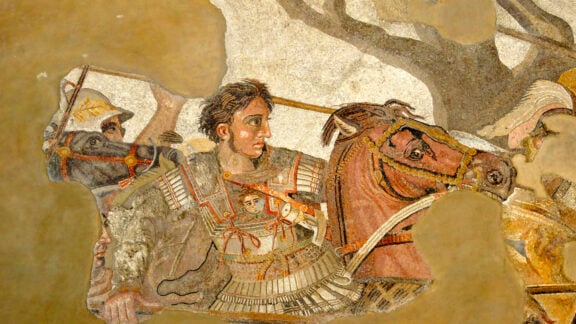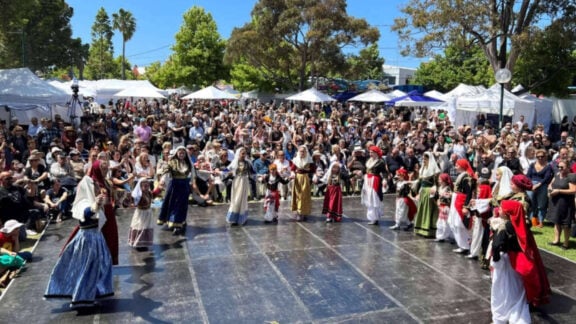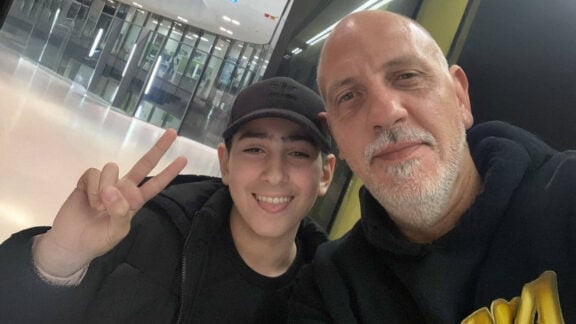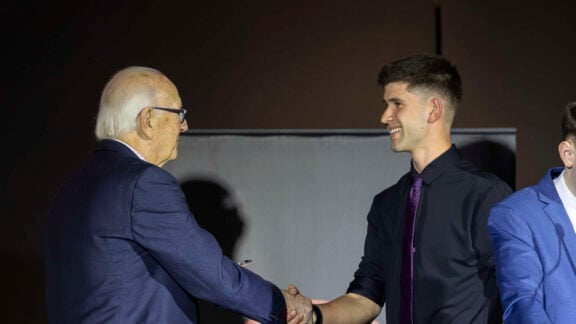Xanthoula Michalopoulou is a philologist who was relocated by the Greek Ministry of Education to schools in Australia from 2016. In the sphere of promoting the Greek language in the schools of Hellenes abroad, she has worked as a teaching assistant in public primary and high schools in Melbourne and Brisbane, where Greek is taught as a second language as well as in a bilingual Greek primary school, where Greek is taught alongside English.
She also worked as a teacher in evening schools in Greek communities and other private institutions, as well as in Greek programs at Melbourne, RMIT and Latrobe University. For two years she taught ancient Greek in a program run by the Hellenic Community of Melbourne. Ms Michalopoulou has worked with students of all ages, from children to adults and in many different levels of language learning, from beginners to advanced students who have recently come from Greece.
Ms Michalopoulou has first hand experience regarding the crisis that Greek studies are going through in Australia which she attributes to various causes, such as; the lack of motivation of students, the wrong choice to limit the teaching of the Greek language to only those students of Greek origin, the media but also teaching methods, or the lack of recognition Greek teachers, that often reaches the limits of discrediting. Wanting to contribute to the fight to save Greek studies in Australia, she shares an analysis of the problem and proposes solutions that could give hope for the future.
“It is unfortunately commonly accepted and a fear of all Greeks living in Australia, that learning Greek in Australia is at a critical point, as there is a phenomenon of constantly stopping Greek programs in public schools and universities, which were organised with great effort and were active. At the same time, the number of students in the evening schools is constantly decreasing or the existing students after many years in the schools are not able to really learn the language, which is a remnant of the past rather than a living organism with present and future.”
LITTLE MOTIVATION FOR LEARNING ANOTHER LANGUAGE
There are many reasons and efforts are certainly being made by all sides to properly analyse and find solutions for the sustainability of Greek learning. From my experience I would say that the crisis of learning Greek is largely due to the fact that the new generations have not developed a strong motivation that will lead them to be seriously interested in learning the language of their ancestors. A large percentage of students answer that they are learning Greek to speak with their grandparents or to go on vacation to the Greek islands, but this is not such a strong incentive to really try to consolidate and speak a language that presents increased difficulty in its learning. In other words, there is no connection between learning a language that requires effort and time and its usefulness in their daily lives, since they will almost never use it, neither professionally nor in their personal life.
Of course the language is part of a heritage that is passed down from generation to generation, but there is a phenomenon that a large percentage of second-generation expatriates speak Greek only to their first generation parents, but only speak English to their third generation children, who are not exposed day-to-day to the Greek language, with the result that they find it very difficult to learn it and immediately lose interest.
Learning a language is largely an experiential affair and I have noticed that children who grew up in a home where Greek was heard in various forms, such as music, movies, conversations, contact with relatives abroad, travel to Greece, etc presented a good background so that they could learn and speak the language more easily. At the same time, their Greek mentality was more developed and they had a closer relationship with Greek culture.
GREEK IS NOT ONLY FOR GREEKS
Another reason why, in my opinion, Greek language learning is in crisis is that learning Greek in Australia is aimed mainly at students of Greek descent and not at students of other nationalities. It could have been better promoted as a foreign language, open to all such as Italian or French, taught from an early age in many Australian public schools. The efforts of all institutions of Greek learning have been focused on teaching Greek to children of Greek origin, but something that is very limiting for the sustainability and continuation of this rich language, which must be promoted and better advertised as a foreign language that everyone deserves to learn. Targeted efforts could be made to introduce Greek in kindergartens and primary schools, so that children of all nationalities can learn Greek as a foreign language at an early age and at the same time learn history and culture, philosophy and all the great ideas of the ancient Greeks who changed the world.
NECESSARY RENEWAL OF MATERIAL AND METHODOLOGY
Regarding the content and the way of teaching the Greek language, text books currently used to teach are very outdated and boring and are without modern supporting material that stimulates the interest of the students of a new era. Children today do not learn in the same way as their parents did and the sterile teaching of grammar and syntax or spelling and vocabulary, which is not accompanied by activities, music, art or computers only discourages young children from learning the language. Properly trained teachers, with new teaching methods and rich material will help to renew the interest in learning the language.
At the same time increasing teaching hours would help children learn faster and more effectively through constant contact with the Greek language. One proposal would be to have groups of teachers, subsidised by expatriate organisations, who will compile appropriate books, adapted to the real needs of the Greek community as well as the collection of support material contributing to the upgrade of the services provided and to the cooperation of all teachers towards a common goal.
RESPECT FOR TEACHERS
The contribution of Greek teachers in language learning is of the utmost importance, so they must be selected with the right criteria and enjoy appreciation and recognition, which is often not a given. The work of Greek teachers must be considered important, both by parents and by the various bodies and be given incentives, financially and professionally so that Greek learning is treated with the required seriousness.
One of the difficulties Greek language teachers face is that many times their earnings are not in line with Australia’s employment status, so they can not survive through this job and are forced to leave it or do it in parallel with another work.
TIME FOR ACTION
In conclusion, I would say that the future of Greek studies in Australia is judged by the collective efforts of institutions, teachers and parents, which should not be limited to discussions and analysis but should be more direct and practical, with a targeted action plan. The support of Greek programs must be not only moral but mainly material, with funds and funding that will allow the programs to survive, at a time when foreign languages are sacrificed on the altar of profit, with a recent example the Greek program of Latrobe University. At the same time, in order to strengthen the interest of the new generations for the language, we must first emphasise the value of their Greek origin, stimulate their pride that they are Greeks, nurture their love for Greece and their roots. Only then will they deeply understand that language and origin are inextricably linked and will find their inner motivation that will lead them to learn this magnificent language and to get to know the culture, philosophy, history and culture of Greece.









